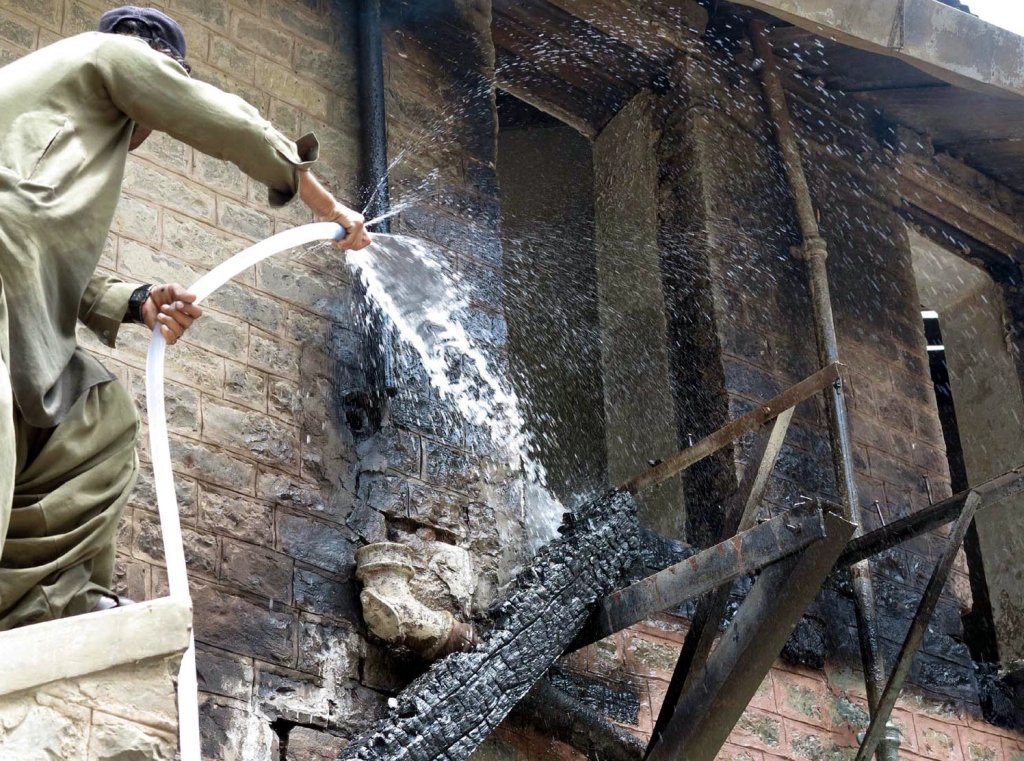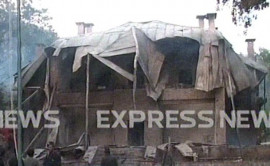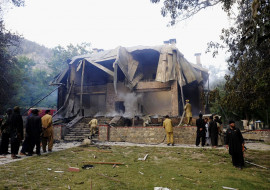
Just a three-hour drive from Quetta, Quaid-e-Azam’s residency – where he spent the last years of his life before succumbing to tuberculosis – stood in the heart of Ziarat, surrounded by the city’s famed juniper trees.
“Quaid-e-Azam loved spending time in hill stations… If it was Simla before partition, it was Ziarat afterwards,” said Syed Jaffar Ahmed, a professor at the Pakistan Study Centre at Karachi University.
“He had been a frequent visitor to Ziarat even before his ailment … it was the freshness of the air and greenery that attracted him to his last abode,” he added.
For those living in other provinces, the residency was nothing short of an emblem of Balochistan itself. This was not just confined to a sentimental association with the country’s founder, but the residency’s image also adorns Rs100 notes, making it part of everyday life in Pakistan.
Ziarat’s original tourist attractions were its lush greenery, beautiful streams and pleasant climate. After 1975 though, when the residency was declared a national heritage site, hordes of people were drawn to the city because of it being home to the Quaid’s last abode.
From dawn to dusk, one could see an assortment of families, school kids and locals lounging in the residency’s wonderfully maintained gardens. A yearly field trip to the residency was a regular feature in many schools and colleges in Balochistan – students were often asked by their teachers to write an account of their visit later.
For children, the Quaid’s complex itself offered an excellent setting for games of hide-and-seek. Until recently – when security had been tightened a little - they could be seen running along the residency’s corridors. The terrace of the complex was a major attraction for visitors as well, as it not only offered a breathtaking view of the valley’s juniper forests, but was also a favourite spot for taking photographs. In more prosperous times, a photographer could be hired at the premises for Rs20 or less.
But it was not just the residency’s architecture and location that attracted tourists. The complex housed several of the Quaid’s personal belongings. The founder’s furniture was kept perfectly preserved in the complex’s rooms, lending them a feel of being frozen in time.
Ziarat, which translates to ‘shrine’, gets its name from the shrine of well-known local saint Kharwari Baba, which is said to bless the valley. But Kharwari Baba’s contemporaries could never have foreseen that the city would one day be renowned more for being someone else’s last abode.
Likewise, none could have foreseen that Quaid-e-Azam’s residency would meet the fate it did on Saturday.
“It was a very important building in our historic narrative… besides its emotional and sentimental values, it was the place’s symbolic value that matters,” maintained Jaffar, adding, “The people who have targeted this heritage sight knew about the symbolic importance of the building and what it means to the state.”
Published in The Express Tribune, June 16th, 2013.
COMMENTS (32)
Comments are moderated and generally will be posted if they are on-topic and not abusive.
For more information, please see our Comments FAQ

























1714024018-0/ModiLara-(1)1714024018-0-270x192.webp)









History has its own way of extracting revenge. It could even be symbolic. Anyone care to remember the violence that 'Direct action' brought in it's tail. Lakhs of people lost their life, property and honour, million homes ruined. Someone above must have felt sad and angry. Hence such punishment. Allah's justice has no time limit. He does not even spare those we humans call great.
Lets deal tightly with culprits.
Jinnah was no saint or 'alim. There is no reason to call this a site of "pilgrimage". He was a politician who through certain contingent events has come to represent the founder of a man made entity, a nation-state, called Pakistan. Pakistanis should think more critically about history and be a bit more suspicious of the neat nationalist history they are made to memorise and indoctrinated with in schools. The sacrality attached to this site comes from the most modern secular apparatuses: the nation-state that strives to construct an imagined community through sites like national monuments.
@truthbetold: After all, Jinnah sent it the army to occupy Balochistan by force.
Thanks for sharing the truth. Jinnah's house has been destroyed by Sunni LeJ organization. Medical school girls have been also killed by Sunni LeJ organization. Pakistan is a land of pure. Sunnis don't think Ahmadis or Shias are Muslims. These attacks have nothing to do with BLA.
@Shakir Lakhani
History has its own way of extracting revenge. It could even be symbolic. Anyone care to remember the violence that 'Direct action' brought in it's tail. Lakhs of people lost their life, property and honour, million homes ruined. Someone above must have felt sad and angry. Hence....
we must die..cuz a person who give us a homeland & we..amazing people!!
This country do not have any future.No even a single day with out bombing and violence...
@Lakhani - Good one! QeAzam din send forces occupy Balochistan.... Google not yet banned in Pakistan, hence my advice to you is LOOK IT UP and step out of your imaginary wonderland.
Why do you mourn this building? Pakistan has turned its back on Jinnah's vision as a secular democracy. Forced conversion, blasphemy allegations, outlawing of Ahmadi religious practice - Jinnah never had this in mind when he declared that "you are free to go to your temples, to your mosques to your churches etc". When a mullah can attempt to press a court to ban the 'blasphemous' Christian Bible, and Chinese workers in Kashmir are accused of blasphemy, you know you have become an international pariah.
Pakistan has turned its collective back on Jinnah and his legacy - so why mourn a bygone man, and a bygone era? Leave the building burned, decaying and destroyed as a symbol of Pakistan's moral and social destruction.
Since Talibanism of Pakistan is taking place, it is time to build a Taliban Heritage House for future generations to see their birthplace.
As long as our leaders will only pay lip-service to Jinnah's vision...............acts like this will happen.
"After all, Jinnah sent in the army to occupy Balochistan by force." Not true. Mr. Jinnah was not the chief executive of the country at the time (if at all force was used, it was decided by the prime minister and his cabinet). Secondly, the Baluchistan Assembly itself opted to join Pakistan. Self-determination for Kashmir is necessary because it is a disputed territory, which Baluchistan isn't.
The recent election in Quetta is an eyes opener for sarmachar loving Baloch nationalists. The citizens of Quetta - an overwhelming majority of them - the Pashtuns, Punjabis, Hazaras or Urdu speaking, rejected the racially discriminatory slogans, arrogance and political narrow-mindedness of these elements. I am convinced that it is the fear and shock of this defeat on political front that forced Baloch insurgents to resort to more violent tactics - an attempt to reassure themselves that Quetta is the ''Baloch capital'' - when in fact they have lost it. Ironically, this reminds me of General Musharaf. His senseless way of handling Balochistan dispute was because of the same fear factor. He tried to counter his political unpopularity by resorting to senseless violence against innocent political activists and the not-so-innocent militants. The Baloch insurgents are doing exactly the same. But, just like Musharaf, they are doomed to fail.
The BLA is to be complemented for having calibrated the strike to cause no death, injury or the possibility of the same even while sending out a robust message that the Balochi’s have no wish to be occupied by Pakistan.
It was just an out of use building. BLA seems far more civilised than the good terrorists (that attacked our temples,trains, bazaars) unleashed on us by Pakistan and the offshoot bad terrorists (that are nowadays attacking women students and religious minorities) with which Pakistan State plans to negotiate.
In this case, No sympathies from my side. Jaisi karni vaisi bharni.
@Sonya: "The destruction of Quaid e Azam’s residence of national heritage value by Al-Qaida linked terrorits " BLA has claimed to have attacked the residency. See: http://tribune.com.pk/story/563531/one-official-killed-in-attack-on-quaid-e-azam-residency-in-balochistan/ Is BLA linked to Al-Qaeda?
His residence in Bombay is safe and he divided India.On the other hand his residence in Pakistan which he created is unsafe,Curious and weird logic!
Pakistanis demand right to self-determination for the Kashmiris. Why not give the Baloch the same rights for self-determination? After all, Jinnah sent it the army to occupy Balochistan by force. How can the Baloch attach any nationalistic respect for a symbol that represents the person who annexed their land by force/
Looking at the old photographs of Quaid-e-Azam’s residency, one is indeed reminded of the beautiful Bran Castle near Braşov, Romania. Maybe it isn't a coincidence that Christopher Lee played Jinnah in the eponymous biographical film.
There was a time when the whole country was being traumatized & terrorized with bomb blasts everywhere. However after the Raymond Davis incident when hundreds of CIA and other operatives were expelled from the country, the terrorism activities almost died down. Now the agencies of these countries are destabilizing Balochistan in desperation.
Pakistan has been facing lack of good leadership over decades. Its time that all political forces in the country unite and involve all stakeholders including the military, and develop consensus to resolve this issue once forever including review of foreign policy.
This country is on the verge of collapse. We have created monsters; we have the most insincere people running the state of affairs. Our media is absolutely immature. The country is literally burning. What defense is the 600 billion going to. No one has answers. Its a shame.
A nation has turned its back on itself
“The people who have targeted this heritage sight knew about the symbolic importance of the building and what it means to the state.”*
Isn't there a loud and clear message there? Shouldn't Pakistan worry that people in a part of the country decided that they needed to highlight their plight in the loudest possible terms by destroying a place which should be held close to the hearts of all Pakistanis ?
Heart bleeds!
Shame on incompetent pak army. This is all happening right under their nose.. why can't 500000+ army is helpless against 500 BLA criminals??? Why we even have impotent army??
I had been to this place. What a cool place. Now I feel someone has set on fire to my memory of Ziarat Residency.
Used to everyday shocks due to bomblasts, bloodshed and loss of lives of innocent people, but the blowing up of Ziarat Residency is some thing which shocked the people of Pakistan who love heritage and history of Pakistan.This act has proved that there is no way out to deal with these terrorists and state is getting weaker and weaker day by day. Nation is now really fed up and tired of all these nuisence and now has reached the opinion that this is game which is designed and being played by those elements which can not be controlled by the state. What so ever reason is, it is the responsiblity of the state to protect the lives, property of the citizens and to solve the issues which are effecting the lives of the people.
The destruction of Quaid e Azam's residence of national heritage value by Al-Qaida linked terrorits has once again proved that Pakistan Muslim League (N) has no whatsover relationship with Quaid e Azam. It is Nawaz Sharif's owned party who work hands in hands for the sake of power and votes.
...I'll give most of us 3 days max to forget about this incident and get over it... Next one please... And Oh yeah, Awaiting that Suo Moto notice of course...
It is now time that the government actually gets serious and starts to destroy the terrorists including the Taliban and these jerks